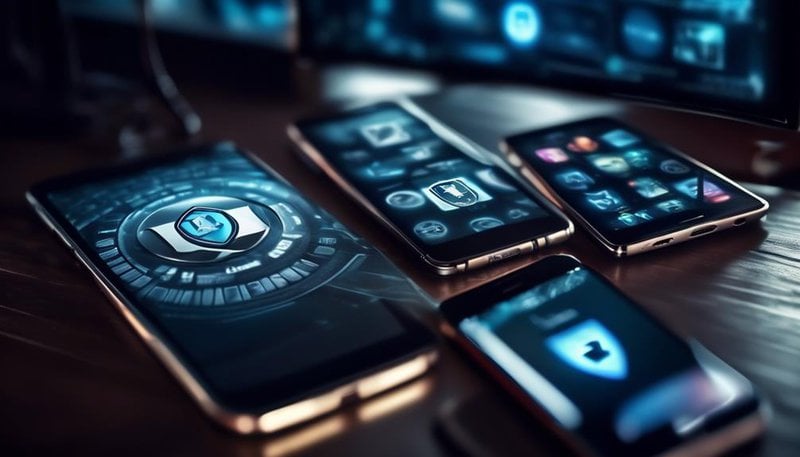Securing Your Digital Life With VPNs on All Devices

VPNs secure your digital life by:
- Encrypting your internet connection
- Hiding your IP address
- Providing anonymity
- Protecting your sensitive information from cyber threats.
Key Takeaways
- VPNs provide encryption of internet connections, hiding IP addresses, and ensuring anonymity, which are essential for online privacy and security.
- Hiding IP addresses with VPNs allows users to access restricted content, enhances security against hackers, and provides privacy for online activities.
- VPNs offer encryption protocols for secure transmission of data, conceal IP addresses to protect against tracking, and shield users from hackers, advertisers, and surveillance agencies.
- Using VPNs on all devices, including mobile devices and computers, helps prevent data tracking, bypass geographic restrictions, avoid targeted advertisements and tracking, and maintain privacy and secure data transmission.
Understanding VPNs and Their Importance
To protect your online privacy and enhance your digital security, it's crucial to understand the importance of Virtual Private Networks (VPNs). VPNs play a vital role in safeguarding your personal information and activities on the internet. However, it's essential to be aware of their impact on internet speed and the potential risks and drawbacks associated with using VPNs.
When you connect to a VPN, your internet traffic is encrypted and routed through a remote server. This encryption can cause a slight decrease in your internet speed, as your data has to go through an extra step before reaching its destination. However, modern VPNs are designed to minimize this impact, and the difference in speed is often negligible.
It's important to note that while VPNs provide an added layer of security, they aren't foolproof. There are potential risks associated with using VPNs, such as the possibility of connecting to malicious or insecure servers. Additionally, some free VPN services may collect and sell your data, compromising your privacy.
Furthermore, VPNs can present certain drawbacks, such as limited server locations, which may affect your ability to access region-specific content. Additionally, some services may impose data caps or throttle your connection speed.
How VPNs Encrypt Your Internet Connection
VPNs employ strong encryption protocols to secure your internet connection and protect your data from unauthorized access. Understanding encryption protocols is crucial in grasping the level of security VPNs offer. Here's how VPNs encrypt your internet connection:
- AES Encryption: VPNs often use Advanced Encryption Standard (AES) to encrypt your data. AES is a widely recognized encryption algorithm that provides strong protection against unauthorized access.
- Secure Tunneling: VPNs create a secure tunnel between your device and the VPN server, ensuring that all data passing through it's encrypted and protected.
- Data Integrity: VPNs use techniques like Message Authentication Codes (MACs) to ensure data integrity. This means that even if someone intercepts your data, they won't be able to modify it without detection.
- Key Exchange: VPNs establish secure key exchanges between your device and the VPN server, ensuring that the encryption keys used are securely generated and exchanged.
- VPN Security Risks: While VPNs provide significant security benefits, it's important to be aware of potential risks such as insecure VPN protocols, logging policies, and data leaks. Choosing a reputable VPN provider and understanding their security measures can help mitigate these risks.
Hiding Your IP Address With VPNs
When it comes to hiding your IP address with VPNs, you gain the benefit of IP address anonymity. By using a VPN, your true IP address is masked, making it difficult for anyone to trace your online activities back to you.
Additionally, VPNs provide encryption that further protects your data and enhances your online privacy.
IP Address Anonymity
Ensuring the anonymity of your IP address is a crucial step in safeguarding your digital presence and protecting your online privacy. By hiding your IP address with VPNs, you can prevent IP address tracking and keep your online activities private. Here are five reasons why IP address anonymity is important:
- Freedom: Anonymity allows you to browse the internet without restrictions, accessing content that may be blocked or censored in your location.
- Security: Concealing your IP address makes it harder for hackers and cybercriminals to track and target you.
- Privacy: Anonymity ensures that your online activities remain private, keeping your personal information and browsing history confidential.
- Geo-blocking bypass: With an anonymous IP address, you can bypass geographic restrictions and access region-restricted content.
- Enhanced anonymity: VPNs provide an additional layer of encryption, further protecting your identity and preventing any unauthorized access to your data.
VPN Encryption Benefits
To further fortify your digital security and protect your online privacy, it's essential to understand the benefits of VPN encryption in concealing your IP address.
VPN encryption protocols play a crucial role in ensuring that your data remains secure and private during transmission. By encrypting your internet traffic, VPNs create a secure tunnel for your data, preventing anyone from intercepting or monitoring your online activities.
This encryption ensures that your IP address is hidden, making it difficult for anyone to track your online movements. With VPN data protection, you gain the freedom to browse the internet anonymously, without the fear of being tracked or targeted by hackers, advertisers, or government surveillance agencies.
VPN encryption provides you with peace of mind, knowing that your online activities are shielded from prying eyes.
Browsing Anonymously With VPNs
When it comes to browsing anonymously with VPNs, you need to prioritize privacy and security.
By masking your identity and encrypting your internet traffic, VPNs ensure that your online activities remain anonymous and protected from prying eyes.
Additionally, VPNs prevent data tracking by hiding your real IP address and replacing it with one from their server network, making it nearly impossible for anyone to trace your online actions back to you.
Privacy and Security
For enhanced privacy and security while browsing, consider using a VPN. A VPN, or Virtual Private Network, creates a secure connection between your device and the internet, protecting your data from potential threats.
Here are five reasons why using a VPN is crucial for maintaining your online freedom:
- Protection against data breaches: A VPN encrypts your internet traffic, making it nearly impossible for hackers to intercept and steal your personal information.
- Anonymity: VPNs hide your IP address, making it difficult for websites and advertisers to track your online activities.
- Access to restricted content: With a VPN, you can bypass geo-restrictions and access content that may be blocked in your location.
- Safe public Wi-Fi usage: VPNs provide a secure tunnel for your data, ensuring that your sensitive information remains protected even when connected to public Wi-Fi networks.
- Prevention of ISP monitoring: A VPN prevents your Internet Service Provider from monitoring your online activities, preserving your privacy.
Take control of your online privacy and browse the internet freely with the added security of a VPN.
Masking Your Identity
Maximize your online anonymity and protect your identity by browsing anonymously with the use of VPNs.
With the increasing threats to online privacy, it's crucial to take steps to safeguard your identity.
A VPN, or Virtual Private Network, provides a secure and encrypted connection that masks your IP address and encrypts your internet traffic.
By using a VPN, you can browse the internet without revealing your true identity or location. This protects you from hackers, government surveillance, and other prying eyes.
VPNs also prevent websites and online services from tracking your online activities.
With identity protection and online anonymity, you can enjoy the freedom to explore the internet without worrying about your privacy being compromised.
Preventing Data Tracking
To enhance your online privacy and prevent data tracking, utilize a VPN to browse the internet anonymously. With a VPN, you can protect your personal data from online tracking and ensure that your browsing activity remains private.
Here are five benefits of using a VPN to prevent data tracking:
- Anonymity: A VPN masks your IP address, making it difficult for websites and online services to track your online activities.
- Encryption: VPNs use encryption protocols to secure your internet connection, keeping your personal data protected from prying eyes.
- Location spoofing: By connecting to a VPN server in a different location, you can hide your true geographical location and further protect your identity.
- No logs policy: Choose a VPN provider that has a strict no-logs policy, ensuring that your online activities aren't recorded or stored.
- Ad-blocking: Some VPNs offer built-in ad-blocking features, preventing online trackers from collecting your browsing data for targeted advertising.
Benefits of Using VPNs on Mobile Devices
Using a VPN on your mobile device provides numerous benefits for securing your digital life. Mobile device security is a major concern in today's digital world, with hackers and data trackers constantly lurking. By using VPNs for smartphones, you can protect your sensitive information and maintain your privacy.
One of the key advantages of using a VPN on your mobile device is the encryption it provides. When you connect to a VPN, all your internet traffic is encrypted, making it extremely difficult for anyone to intercept or access your data. This is especially important when you're using public Wi-Fi networks, which are notorious for their lack of security.
Another benefit of using a VPN on your mobile device is the ability to bypass geographic restrictions and access content that may be blocked in your region. With a VPN, you can connect to servers in different countries and access websites, streaming services, and social media platforms that are otherwise inaccessible. This gives you the freedom to browse the internet without limitations.
Furthermore, using a VPN on your mobile device can also help you avoid targeted advertisements and tracking. VPNs mask your IP address, making it difficult for websites and advertisers to track your online activities. This means you can enjoy a more private and personalized browsing experience.
Securing Your Digital Life on Computers With VPNs
Securing your digital life on computers can be effectively achieved through the use of VPNs. By encrypting your internet connection and masking your IP address, VPNs provide a secure and private online environment. Here are five reasons why using a VPN on your computer is crucial for protecting your personal data and defending against cyber threats:
- Secure Data Transmission: VPNs create a secure tunnel for your data to travel through, safeguarding it from potential eavesdroppers or hackers.
- Anonymity and Privacy: With a VPN, your real IP address is hidden, making it difficult for anyone to track your online activities or identify your location.
- Bypass Geographical Restrictions: VPNs allow you to bypass geographical restrictions and access regionally restricted content, providing you with freedom and flexibility.
- Protection on Public Wi-Fi: VPNs protect your data when connected to public Wi-Fi networks, ensuring that your personal information remains safe from prying eyes.
- Prevent ISP Tracking: By encrypting your internet traffic, VPNs prevent your Internet Service Provider (ISP) from tracking and monitoring your online activities.
Securing your digital life on computers is essential for maintaining your privacy and protecting your personal data from cyber threats. By utilizing a VPN, you can enjoy the freedom and peace of mind that comes with a secure online experience.
Choosing the Right VPN for All Your Devices
When selecting a VPN for all your devices, it's crucial to choose one that meets your specific needs and provides comprehensive protection. Whether you want to enhance your gaming experience or secure your smart home devices, finding the right VPN is essential.
For gamers, a VPN can offer several advantages. It can help reduce lag by providing a more direct and stable connection to gaming servers. Additionally, it can protect your personal information and prevent DDoS attacks, ensuring a safe and uninterrupted gaming session. Look for a VPN that offers fast speeds, low latency, and a wide range of server locations to optimize your gaming performance.
When it comes to securing your smart home devices, a VPN can add an extra layer of protection. By encrypting your internet traffic, it safeguards your sensitive information from potential hackers. Additionally, a VPN can prevent unauthorized access to your smart home devices, ensuring your privacy and security. Look for a VPN that supports multiple simultaneous connections, so you can protect all your devices at once.
Frequently Asked Questions
Can I Use a VPN to Access Websites That Are Blocked in My Country?
Yes, you can use a VPN to access websites that are blocked in your country. VPNs bypass censorship and provide online privacy, ensuring your freedom to access the content you want.
What Is the Difference Between a Free VPN and a Paid VPN?
You might think a free VPN is the way to go, but don't be fooled. Paid VPNs offer better security, encryption, and reliability. Don't compromise your digital freedom for a few bucks.
Can I Use a VPN to Protect My Online Banking Transactions?
Yes, you can use a VPN to protect your online banking transactions. It provides encryption and masks your IP address, adding an extra layer of security to keep your financial information safe.
Will Using a VPN Slow Down My Internet Connection Speed?
Using a VPN may slightly slow down your internet connection, but the benefits outweigh the drawbacks. It can bypass ISP throttling, improve streaming quality, and ensure your online activities remain private and secure.
Are VPNs Legal to Use in All Countries?
Using a VPN may have legal implications in certain countries. It is important to be aware of potential consequences before using one. If VPNs are not allowed, explore alternative methods to secure your digital life.








